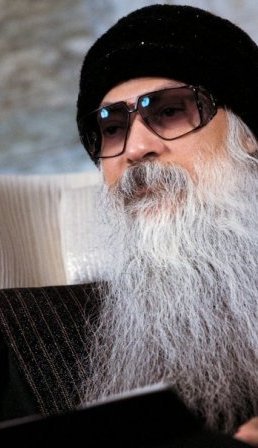If sadness and sorrow overtake you in life, you must have taken some wrong step; when you suffer, know that you have gone astray. The suffering is only a pointer, don’t make it your life style; don’t become masochist, for masochism is a disease from which many people suffer.
Any moment of great happiness will also be a great moment of sadness.
This is what is the attitude of a meditator — to look at everything but not to jump into it. Whatsoever passes is good. Sometimes happiness comes, sometimes sadness, anger, jealousy — you need not make them your problems. You have the attitude as if you are waiting at the railway station in the waiting room. So many people coming and going — good and bad, saint and sinner — it is none of your concern; you simply sit in your chair unconcerned. You are waiting for your train, and these people are not coming for you — you don’t even know who they are. You are not in a judging mood of who is good and who is bad, because you judge only when you think this is your home.
Hypocrisy means you pretend to be something which you are not. You know it, it hurts, hence it creates sadness. The whole world is full of sadness because the whole world has been directed to create character, morality. My effort here is just the opposite. I am not interested in character at all, in morality st all. I sm not telling people to be immoral, I am telling people to be conscious, to create consciousness.
My sannyasins are not to be sad people. Enough of sadness! Throughout the whole past of humanity we have created sad saints and sages. It has been a nightmare. Now we need cheerful sages, saints who are capable of love and laughter. God is fed up with your old saints. He is continuously informing me not to send any more of the old type of saints. He needs a few dancers in heaven, the singers, lovers — the old saints have made heaven look like hell. So I am preparing my people.
If you say you will not move into sadness, that you want only happiness, then you cannot flow. Flow is only possible if you accept everything as it is, unconditionally.
Silence has something in it that is very much like sadness. It is not sadness, but it is very much like it. So when you start becoming silent, you may also feel a certain type of sadness. Don’t be afraid of that, or you will start trying to get out of it. It is not sadness, but just the feeling of silence, the depth, gives you a certain sadness. It is beautiful, mm? People who go into silence have to encounter this problem, and have to understand that there are different types of sadness. There is a sadness that comes out of frustration; a sadness that comes out of being empty, and inner poverty. And there is a sadness that comes out of silence, out of total fullness, but it is also alive.
Silence will give you sadness, and aloneness. You will need a little time to become familiar with those different shades and different flavours.
Change only one thing, change from misery to bliss. from sadness to celebration. And it can be done very easily because misery is an unnatural thing.
My path is the path of bliss. It is not of sadness, it is not of seriousness. Sadness and seriousness are pathological. The so-called saints who appear very serious, are really ill people. They are not whole. They have become incapable of laughter, they have become incapable of cheerfulness – and to be incapable of cheerfulness and laughter is really to commit suicide. They have committed suicide. But we have worshipped these people for centuries because we are worshippers of death, not of life. And we worship a person who becomes dead even while he is alive, who starts living a kind of post-humous existence. He becomes a mahatma, a sage, a saint.
My sannyasins have to live a life of bliss — that is their meditation. They have to drop all seriousness, they have to become more playful. They have to look at life not as a problem but as a mystery. If you look at it as a problem you become serious because then a great temptation arises to solve it — and it is insoluble. It will lead you into more and more seriousness and into frustration and into sadness.
The only thing really beautiful is blissfulness. And the only thing ugly is sadness, misery. But because the majority of human beings live in misery, they worship misery. They are afraid of bliss, they are afraid of blissful people. They cannot believe that somebody is really blissful.
We become identified with anything that comes in front of us. When the cloud of anger is there we think we are anger; when the cloud of love is there we think we are love. When compassion is there we think we are compassion; when sadness is there we think we are sadness. We are none of these: we are the watcher. Anger will come and go and the watcher abides. Sadness comes and passes by and the witness remains. To remember that witness more and more will make you integrated, because that is the only centre which is everlasting, eternal; and only on the eternal rock of witnessing can a real life be built. Otherwise we are making our houses on sand, quicksilver. We cannot even complete it — it always falls in the middle.
Let this become your key — next time when anger comes, just watch it. Don’t say ‘I am angry’; say rather ‘Anger is there; I am watching it.’ And see the difference! The difference is vast. Suddenly you are out of the grip of anger if you can say ‘I am just a watcher; I am not anger.’ When sadness comes, just sit by the side and look at it and say ‘I am the watcher; I am not sadness’ and see the difference. Immediately you have cut the very root of sadness. It is no more nourished; it will die of starvation, because we feed these emotions by being identified with them.
Be aware of the body and its action. Walking, walk with alertness; don’t walk like a robot, like a machine. When thinking, watch; what thoughts are moving, Just go on seeing; what desires are spinning and weaving their nets around you. Just go on watching. Go on watching how subtle dreams are moving like an undercurrent deep down in your unconscious. Watch your feelings, moods, how they suddenly arise as if from nowhere; just a moment before you were so full of joy and now you are so sad. Just watch how it happens, see the bridge … how joy becomes sadness, how sadness becomes joy.
Slowly slowly your moods start disappearing. You are no more very joyous and no more very sad. The difference between joy and sadness starts becoming less. Soon a moment of equilibrium is reached when you are neither sad nor joyous. And that is the moment when bliss is felt. That tranquillity, that silence, that balance, is bliss.
One who is surrendered to god need not say anything, the very surrender will transform his life. All that is needed on the part of the seeker is to drop the ego because ego is the only cause of all our misery and sadness.
Blissfulness has totally disappeared, and the strangest thing is that it has disappeared because of the so-called religious people in the world. The religious people have created a kind of seriousness. They have destroyed cheerfulness, they have condemned cheerful as something mundane, profane, sacrilegious. They have raised sadness, seriousness, to the heights of saintliness.
One has to become more and more alive, full of zest, gusto, intensity. One should not withhold. When you are full of life love starts happening on its own accord, because what you will do with life, what you will do with that overflowing energy? You will have to share it — that’s what love is: sharing of your life energy. And the moment you share your life energy all sadness disappears, then life is just a heartfelt laughter.
Now this indivisible atom of consciousness can exist in two ways: it can exist in sadness — then it is in the world — it can exist in bliss; then it is in god. These are just two styles possible, and the same energy is needed for both. The same energy not allowed to move becomes stagnant, stale, creates sadness. The same energy allowed, expressed, flowering, overflowing, becomes bliss.




